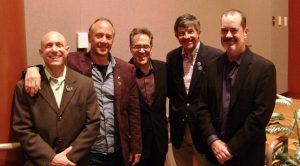
In the essay “The Ecology of Trauma: Resilience in a Post-9/11 Nation” Naisa Wong writes, “Social and trauma theorists distinguish that it is communal acknowledgement, the emergent struggle towards rebuilding and the social evidence of that strained effort — not merely the stand alone event or origin of trauma itself — that makes healing from trauma a collective experience.”
A moderated discussion with Mark Barden, Ian Hockley, Jeremy Richman and David Cole Wheeler took place on October 1, in the Konover Auditorium / Dodd Center at the University of Connecticut – Storrs Campus. Each of these four fathers lost his child at Sandy Hook Elementary School (Newtown, CT) on December 14, 2012.
One of the cornerstones of Ahimsa (Sanskrit for Non-violence) as a principle and practice is to see the interconnections between all beings. Today we live in a world that often seems mainly interconnected by violent interactions, impoverishment of many forms, and the domination of the powerful over the vulnerable.
Acknowledging vulnerability and yet a hopeful possibility for beneficial change, the UConn students, faculty and staff in attendance engaged in an extraordinarily intimate and moving exchange, as the fathers discussed with raw honesty the pain and trauma of losing a very young child and the arc of their own personal healing experience. And in sharing the work each has chosen to pursue in the aftermath — from legislative advocacy to scientific research to improving services for autistic children in our schools to the everyday work of continuing to be parents to surviving children – audience members were given the rare opportunity to learn up-close about what faith, forgiveness and compassion mean to them, after sustaining such terrible personal loss.
Our 2015 Ahimsa / Nonviolence program that annually honors the Mahatma Gandhi’s philosophy of non-violence was offered as a unique opportunity and a powerful evening for the UConn students and invited guests to engage in a serious dialogue about the nature of loss, suffering, traumatic growth and healing, and moving forward to make the world a better place.
The fathers agreed to do this talk because they were clear in their minds that they offered something positive, and steadfast in their belief that these are important conversations that can change people’s lives for the better.
“Four Fathers, Four Journeys” was several months in preparation amid the often heated debates about the devastating effects of gun violence in our communities. The program’s significance and timeliness was still more dramatically punctuated by the Umpqua Community College campus shooting that occurred just hours before in Oregon.
The Asian/Asian American Studies Institute is honored and privileged to deepen its collaboration with key members of the Greater Hartford Jain Center for their generous and continuing support.